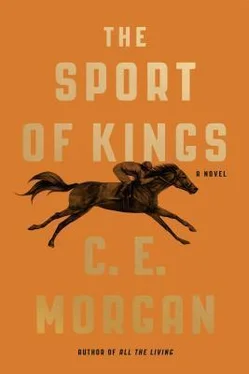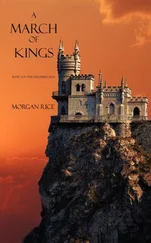“Oh, I’m just a lover,” Loretta said airily. “I don’t even see color. I’m beyond all that.”
Henry scowled at her, and she said, “Don’t be such a stick in the mud.”
Then she spotted their fathers now on the porch, still in conversation, John Henry’s back rimrod straight with his strict dignity, which never altered. Loretta grasped Henry’s elbow suddenly, so that he almost stumbled over his own shoes. She whispered, “Don’t tell about … okay?”
“You really do think I’m an idiot,” he snapped.
“Ha!” She laughed, tossing the fall of her hair over one shoulder. “I think you’re pure as the driven snow!” And she flounced on ahead of him toward the house.
* * *
“Henry Forge!”
No. He wouldn’t go. He was stacking boxes for his mother in the attic, where the family history lay organized and covered in sheets under the roof, where birds roosted as if on thin black soil, calling as his father was calling.
“Henry Forge!”
Who died and made me your slave? His insolence was a physical delight.
“Do not make me find you! Now!”
It still owned him. It. His lace-ups clapped the servants’ stairs, one after the other; they beat out the steady rhythm of John Henry. His only disobedience was his desultory pace.
His father was standing at the rear door off the kitchen, his pale blue striped sleeves rolled up over his freckled biceps, the short red hairs glinting there. By now, the hair on his head was completely gray. It always startled.
“What took you so long?” he said, turning to open the door to the backyard, where the morning was rioting in the dew and sparking off the crisp grass and the hedges. “Come along.”
As Henry descended the limestone steps off the back door, half-blinded by the acid light, his father picked up clippers and a saw from the ground. He said, “Fetch a ladder, please.”
“What for?” The words slipped off his truculent tongue before he could stop them. Even now, at the threshold of his adult life, he was just a little boy asking for answers from a man who wouldn’t answer.
But this time John Henry replied. “We’re cutting mistletoe from one of the trees. Apparently, if you want a job done correctly, you can’t hire men who are too busy rolling their own damn cigarettes to do any work. You have to do it yourself.”
By the time Henry had found the twenty-foot ladder in one of the old cabins, his father was a solitary figure in the orchard. Henry followed after him as best he could, clumsily balancing the shaky length of the ladder on two pinched palms. Before him, the wild fecundity of the orchard bloomed in the light wind that sluiced gently through the avenues of trees. The wind seemed to come directly from the sun, a perfect globe of red risen confidently out of the laden boughs. That globe commanded all the life of the garden, the many million blades of grass, the thick stalks of the trees with their secret rings, the gradations of green flourishing off the dark limbs and in their shadows, and the red, hanging apples.
John Henry stopped before one tree, about twenty deep, where the house couldn’t be seen and where the privacy was nearly primordial. He pointed upward. “Mistletoe,” he said. “Poison,” he added.
At first, Henry could detect nothing but bright fruit and limitless green punctured by the sun, but then, squinting, he discerned there, among the healthy branches, a smattering of pale seeds like tiny pearl onions or white trinkets clustered in a bush of hardy leaves. It had the look of a wildly disordered bird’s nest. The tree branch was suffering under the leaching plant, which drained its natural strength. With care, Henry positioned the ladder next to the blighted branch.
“My hope is that it can be merely clipped out. I don’t want to lose my tree, or any tree.”
“Well, one tree—” Henry began.
“I planted these two rows of trees when your brothers were born.”
It was as if the sentence had been said by someone else, so foreign was its meaning. At first, Henry simply stood there, staring stupidly as his father adjusted the clippers in his hand and set his hands on the ladder, peering upward.
“I don’t understand,” he said.
Looking up at the mistletoe clump, where it encircled the branch in a draining embrace, John Henry said, “There were two children before you were born. The first died right after birth, the other died in its second month. There was a great deal of rejoicing, then a great deal of bitterness.”
Henry’s astonishment wrote red across his cheeks. There was a pained accusation in his voice when he said, “Why didn’t anyone ever tell me?”
“Because it almost killed your mother, and it wasn’t your business,” came the reply. “So I have my reasons for preserving this orchard.” And after one deep breath, girding himself with self-assurance, John Henry placed one foot on the first rung and slowly began to climb. Henry, his outrage growing even as he held the ladder steady, blurted, “Why do you always treat me like a child?”
This time there was no reply as John Henry hesitated on the second rung, his brow furrowed and a trembling causing his khakis to shake.
It was the subtlest of movements, but Henry grabbed instinctively at his father’s strong, bunchy calf to steady him. “Are you okay?” He saw the steeling of his father’s jaw, the way he thrust his chin forward toward a rung of the ladder to gaze resolutely skyward, and he started in surprise. “Father, are you afraid of heights?”
Only a grunt as a reply. But his father seemed to inch up the ladder, rather than climb, each motion slowed by hesitation. What door had been opened on conversation was closed again, and the room of their understanding was silent.
Father, I didn’t know you were afraid of anything.
Oh oh but perhaps I did
For a moment, he wanted to say, Why don’t you let me do it, but he was spellbound by those strangely enfeebled movements his father made as he climbed and, toughened by his sense of injustice, he scraped the last bit of love off his tongue with his teeth. Presently, the gray head disappeared into the ceiling of green. Then the voice — the authority that had circumscribed his life for sixteen years — called down, “It’s too late. It’s gotten into the vasculature and the branch is stunted. Goddammit. Hand me the saw.” And the clippers dropped down with a thud to the ground.
Henry picked up the saw by its serrated teeth and, because his father had climbed so high, he ascended the first two rungs of the ladder. John Henry, watching him come, reached down with an awkward, curtailed gesture, still clinging with desperate force to a higher rung. Henry felt the ladder shake with his father’s shaking. It shook its way right past his fingertips into the muscles of his chest.
John Henry grabbed the saw and placed its teeth about two feet from the infestation.
“I hate to do it,” he said.
But of course you will, his son thought with a wintry scorn. His father began to cut away the injured limb to save the tree, draw after grating draw until it came crashing down with its mistletoe intact, bright green.
Henry watched it come down, but John Henry still gazed upward into the fragrant compass of the tree. Then he began his slow, unnerved descent, one painful rung at a time, as Henry said, quietly, “Take it slow,” as if his words were an encouragement and not a slap, and his father came, his breathing audible, the ladder trembling, until his feet were on firm ground, and he simply stood there, gripping the ladder sides, breathing like a gladiator.
John Henry turned his flushed face to the side and said, “What we talked about today, don’t mention it to your mother. She never wanted you to know.”
Читать дальше
Конец ознакомительного отрывка
Купить книгу












